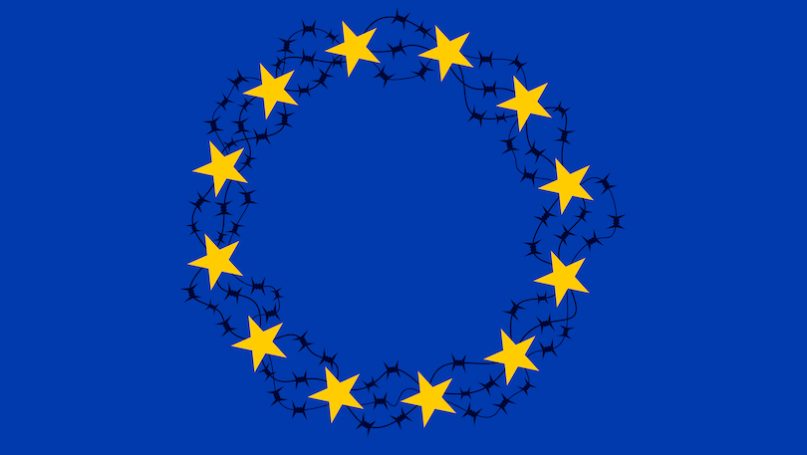
Increasingly since 2017, Europe has cherry picked human rights principles and evaded its legal obligations and humanitarian responsibility to offer protection to migrants seeking safety, dignity and livelihood at its borders. No clearer is this than in the Central Mediterranean, where Europe’s approach to migration has centred around border externalisation and pushbacks of migrants to Libya – where they face abuses that may amount to crimes against humanity, including enslavement, murder, torture and rape. This is done through bilateral cooperation with Libyan authorities and institutions, including state-affiliated militias.
At the same time, Europe has consistently obstructed and criminalised NGOs and merchant vessels that seek to address and limit these abuses and rescue migrants at sea, and European divisions over migration, coupled with growing far-right sentiments continue to hinder the establishment of comprehensive, sustainable solutions. As a result, brutal and unlawful migration policies have remained largely the same over recent years.
In response, lawyers and human rights experts from around the world have fervently pursued formal accountability avenues to resist this agenda, bringing forward cases to domestic courts of European states and to regional courts including the Court of Justice of the European Union and the European Court of Human Rights. Submissions have also been filed with the International Criminal Court (ICC), as well as to UN-based mechanisms such as the UN Committee on Torture.
Civil society – which includes, but is not limited to, non-governmental organisations, cultural institutions, faith groups, lawyers and universities – have had notable impact. For example, a communication filed to the ICC by Lawyers for Justice in Libya and two other human rights organisations calling for an investigation into the crimes committed against migrants and refugees in Libya helped trigger a preliminary assessment by the ICC Prosecutor of the crimes committed against migrants. This resulted in the first public acknowledgement that these crimes may constitute crimes against humanity and war crimes.
In June 2014, the Office of the Prosecutor of the ICC also reopened its investigations into the responsibility of UK military officials for war crimes in Iraq between 2003 and 2008, based on Article 15 communications received from two NGOs.
Other evidence shows that resistance through formal accountability channels can eventually lead to successful legal challenges. Lawyers and activists who stopped the first flight due to take asylum seekers from the UK to Rwanda brought joint judicial reviews to the High Court to challenge the legislation surrounding the removals.
However, beyond legal channels, civil society also have the power to turn the dial on the narrative around migration, from a security discourse of border management and the criminalisation of migration to a human narrative rooted in the freedom to migrate, the right to international protection, the vital contributions of migrants to society, and the treatment of migrants as empowered agents.
Social media and other online platforms, as a tool for mobilisation and advocacy, continues to grow in importance. Violations at Europe’s external borders are being increasingly documented and shared online, naming and shaming the tactics that states use to undermine and ignore human rights. This evidence has been able to reach users of the internet, including investigators and lawyers, from all corners of the globe.
Transnational civil society networks also have the potential to create and mobilise strong and sustainable movements around particular human rights issues. There are numerous examples of powerful movements that have confronted social injustices from the bottom-up, such as the Black Lives Matter movement which has begun to successfully tackle systemic racism in the United States and other Western nations.
Successful movements can spark the interest of a plethora of actors to the cause, from private companies to local mayors, to trade unions and student associations, giving politicians and policymakers fewer and fewer allies that tolerate their human rights-violating discourse and practices.
For grassroots individuals and organisations, pushing against the powerful political and ideological current is a huge challenge and may appear to be unfruitful. However, given the current state of affairs in Europe and globally, bottom-up change, driven by vibrant and interconnected civil society networks – working in solidarity both with one another – may be the only vehicle left to achieve accountability.
If the human rights-migration advocacy network in Europe can rally more actors behind this cause, continue seeking accountability for crimes and human rights violations committed against migrants, find creative ways to employ existing legal instruments and centre the voices of migrants, Europe’s politicians will be left with few options but to conform and ensure European migration policy reform enshrines just and equitable human rights principles.
Further Reading on E-International Relations
- Opinion – A New Pact on Migration and Asylum in Europe
- European Union Migration Law and Policy
- Opinion – The Libyan Border as a Testing Ground for European Sovereignty
- Solidarity Beyond the State in Europe’s Common European Asylum System
- European Union Readmission Agreements: Deportation as a Gateway to Displacement?
- Observations on Migration in the Twenty-First Century: Where to from Here?